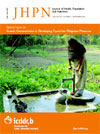
|
The Journal of Health, Population and Nutrition
icddr,b
ISSN: 1606-0997
EISSN: 1606-0997
Vol. 32, No. 1, 2014, pp. 111-117
|
 Bioline Code: hn14014
Bioline Code: hn14014
Full paper language: English
Document type: Research Article
Document available free of charge
|
|
|
The Journal of Health, Population and Nutrition, Vol. 32, No. 1, 2014, pp. 111-117
| en |
Sodium and Potassium Intake of Urban Dwellers: Nothing Changed in Yazd, Iran
Mirzaei, Masoud; Soltani, Mohammadhossien; Namayandeh, Mahdieh & GharahiGhehi, Neda
Abstract
To assess the daily salt intake of people aged 20-74 years based on the 24-hour urinary sodium excretion
in urban population of Yazd, a population-based cross-sectional study was conducted. This is a substudy of
Yazd Healthy Heart Project in Iran. From 2004 to 2005, two thousand people of the urban population of
Yazd city, aged 20-74 years, were enrolled in the main study. Overall, 219 volunteer participants of 20-70
years were enrolled in this substudy. Sample frame was the household numbers according to the database
of Yazd City Health Services. Calcium, phosphorus, sodium, potassium, and creatinine were measured in
the urine samples collected from the participants over a 24-hour period. Sodium content in urine over 24
hours was 171.7±82.9 mmol/day in males and 127.8±56.1 mmol/day in females (p<0.0001) while potassium
content was 49.4±23.2 mmol/day in males and 41.5±25.1 mmol/day in females (p=0.2). Estimated
average daily salt (NaCl) intake was 10.0±4.8 g/day in males and 7.5±3.3 g/day in females (p<0.0001). Only
one participant had the ideal Na/K ratio of less than one. Na/K ratios greater than one and less than two
were seen in 11.3% (n=24), and a ratio equal to or greater than 2 was observed in 82.3% (n=118) of the
participants. The average Na/K ratio was 3.69±1.58. Unlike many developed countries where sodium intake
declined over the past few decades, the daily sodium intake in Yazd is high, and daily potassium intake
is low. This is similar to what was observed four decades ago in an area not far from Yazd. Efforts must be
directed towards health promotion interventions to increase public awareness to reduce sodium intake and
increase potassium intake.
Keywords
24-hour urine; Blood pressure; Cardiovascular disease; Hypertension; Policy; Potassium; Prevention; Salt; Sodium; Iran
|
| |
© The Journal of Health, Population and Nutrition
Alternative site location: http://www.jhpn.net
|
|
